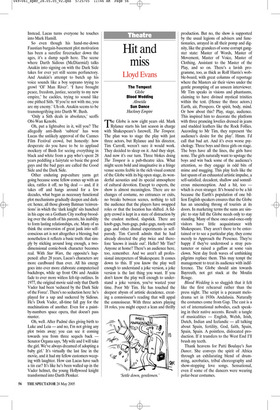Hit and miss
Lloyd Evans
The Tempest Globe Blood Wedding Almeida Sun Dance Hackney Empire
The Globe is now eight years old. Mark Rylance starts his last season in charge with Shakespeare’s farewell, The Tempest. The plan was to stage the play with just three actors, but Rylance and his director, Tim Carroll, weren’t sure it would work. They decided to sleep on it. And they slept. And now it’s our turn. Three blokes doing The Tempest is a pub-theatre idea. What might seem bold and imaginative in a fringe venue seems feeble in the rich visual context of the Globe with its big open stage, its wonderful acoustics and its special atmosphere of cultural devotion. Except to experts, the show is almost meaningless. There are no changes of costume, no entrances or exits, no breaks between scenes, nothing to tell the audience that the players have swapped roles or that the location has shifted. A fidgety crowd is kept in a state of distraction by the crudest method, slapstick. There are knob-gags, bum-gags, puke-gags, nasty-smell gags and other dismal experiments in selfparody. Tim Carroll admits that he had already directed the play twice and therefore ‘knows it inside out’. Hello? Mr Tim? Anyone at home? There’s an audience here, too, remember. And we aren’t all professional interpreters of Shakespeare. It comes down to this. If you know the play well enough to understand a joke version, a joke version is the last thing you want. If you don’t know the play well enough to understand a joke version, you’ve wasted your time. Poor Mr Tim. He has touched the deepest abysm of artistic decadence, creating a connoisseur’s reading that will appal the connoisseur. With three actors playing 18 roles, you might expect a lean and thrifty production. But no, the show is supported by the usual legions of advisers and functionaries, arrayed in all their pomp and dignity, like the grandees of some corrupt gangster state: Master of Words, Master of Movement, Master of Voice, Master of Clothing, Assistant to the Master of the Play, and so on. There’s a lavish programme, too, as thick as Rolf Harris’s wobble-board, with great columns of reportage where the Masters air their views under the gentle prompting of an unseen interviewer. Mr Tim speaks in visions and phantasms, claiming to have divined mystical trinities within the text. (Hence the three actors.) Earth, air, Prospero. Or spirit, body, mind. Or how about this? Play, stage, audience. This inspired him to decorate the platform with three prancing lovelies dressed in jeans and studded leathers like the Rock Follies. According to Mr Tim, they represent ‘the audience’s desire for the play’. Hmm. I’d call that bad art. And it’s even worse psychology. Three boys and three girls on stage. The boys have all the lines, the girls have none. The girls naturally want to upstage the boys and win back some of the audience’s attention, so they engage in odd bits of mime and mugging. This play feels like the last spasm of an exhausted artistic impulse, a self-satisfied, decadent, shallow and somniferous misconception. And a hit, too which is even stranger. It’s bound to be a hit because the Earth’s population of one billion English speakers ensures that the Globe has an unending throng of tourists at its doors. In marketing terms the sums are simple: to stay full the Globe needs only to stay standing. Many of these once-and-once-only visitors have little acquaintance with Shakespeare. They aren’t there to be entertained or to see a particular play, they come merely to Approach the Presence. They’re happy if they’ve understood a stray pentameter or raised a guffaw at some vain clown. Next day fresh waves of unthinking pilgrims replace them. This may tempt the management to treat its audience with indifference. The Globe should aim towards Bayreuth, not get stuck at the Moulin Rouge.
Blood Wedding is so sluggish that it felt like the first rehearsal rather than the press night. The script is a peasant melodrama set in 1930s Andalusia. Naturally the costumes come from Gap. The cast is a set of international nobodies, each speaking in their native accents. Result: a tangle of musicalities — English, Welsh, Irish, Dutch, Indian and Icelandic — all talking about Spain, fertility, God, faith, Spain, Spain, Spain. A pointless, dislocated production. If it transfers to the West End I’ll brush my teeth.
Thank heavens for Patti Boulaye’s Sun Dance. She conveys the spirit of Africa through an exhilarating blend of drumming, acrobatics, tribal choreography and show-stopping love songs. Sensational, even if some of the dancers were wearing polar-bear costumes.






















































 Previous page
Previous page